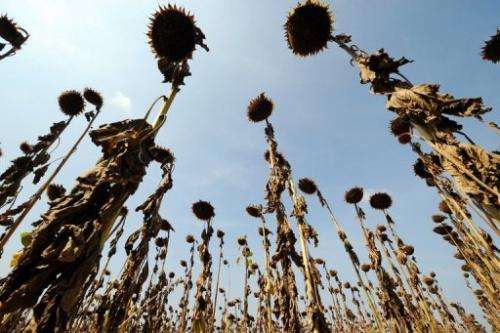Climate change: drought benchmark is flawed, study says

A scientific method used in a landmark UN report that said warming was intensifying global drought is badly flawed, a study published on Wednesday said.
Contrary to what the UN's Intergovernmental Panel on Climate Change (IPCC) suggested in 2007, there is little evidence that global droughts have become longer or more extreme in recent decades, it said.
But, it cautioned, some regions have experienced more droughts and others less so.
Published in the journal Nature, the study takes aim at a technique called the Palmer Drought Severity Index, or PDSI.
The PDSI was used as the basis by the IPCC in its 4th Assessment Report, a document that stoked deep concern about global warming, leading to the 2009 Copenhagen Summit on climate change.
The 4th Assessment Report said it was likely that "more intense and longer droughts" had been observed "over wider areas" since the 1970s.
But, according to a team led by Princeton University environmental scientist Justin Sheffield, the PDSI is a blunt instrument that should be tossed out.
Developed in the 1960s to help allocate aid for stricken US farmers, it calculates drought risk on the basis of rising temperatures, but does not use other factors that affect soil evaporation, they said.
"The previously reported increase in global drought is overestimated because the PDSI uses a simplified model of potential evaporation that responds only to changes in temperature and thus responds incorrectly to global warming in recent decades," the investigators said.
"More realistic calculations, based on the underlying physical principles that take into account changes in available energy, humidity and wind speed, suggest that there has been little change in drought over the past 60 years."
Why the PDSI remains in use is "a curiosity," the team said pointedly, warning of the risk of overestimating the impacts from climate change.
The IPCC stepped back from its 2007 drought assessment in a special report on extreme events, published this year.
That report, dubbed SREX, said "there are still large uncertainties regarding observed global-scale trends in droughts."
In line with Wednesday's study and other recent research, SREX said some regions had seen an increase in drought trends, and others a decrease.
The 938-page, 4th Assessment Report came under attack from climate skeptics after one of its sections was found to have several inaccuracies.
In 2010, a five-month independent probe into "Climategate" recommended an overhaul of the IPCC's workings to avoid similar slips in its 5th assessment report, due to be published in 2014.
But it did not challenge its core findings, which are accepted by the overwhelming majority of climate scientists.
More information: Paper: Nature, November 15, 2012. pp 435-438. www.nature.com/nature/journal/ … ull/nature11575.html
Journal information: Nature
(c) 2012 AFP



















